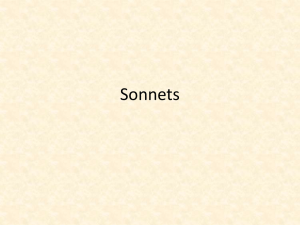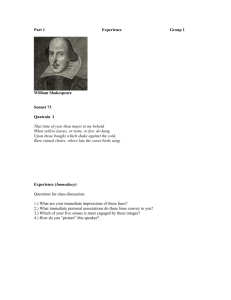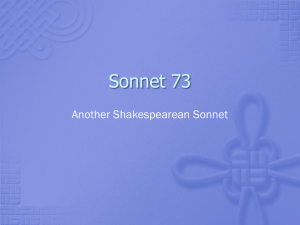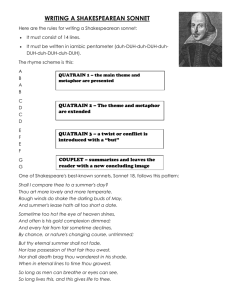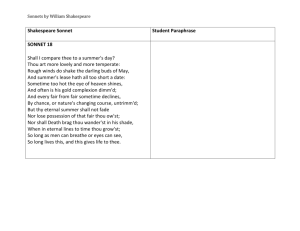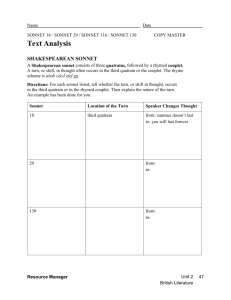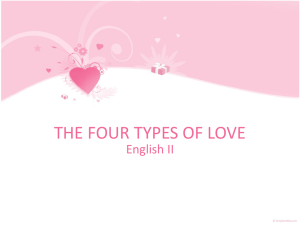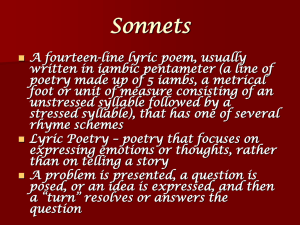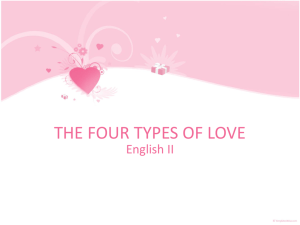File
advertisement
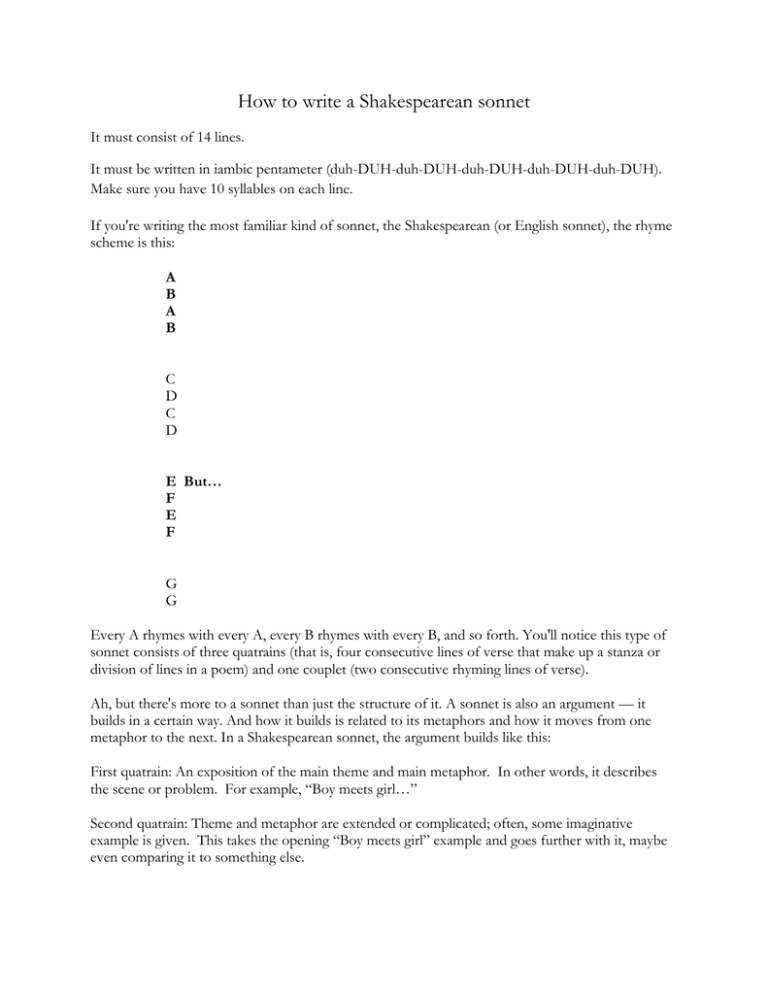
How to write a Shakespearean sonnet It must consist of 14 lines. It must be written in iambic pentameter (duh-DUH-duh-DUH-duh-DUH-duh-DUH-duh-DUH). Make sure you have 10 syllables on each line. If you're writing the most familiar kind of sonnet, the Shakespearean (or English sonnet), the rhyme scheme is this: A B A B C D C D E But… F E F G G Every A rhymes with every A, every B rhymes with every B, and so forth. You'll notice this type of sonnet consists of three quatrains (that is, four consecutive lines of verse that make up a stanza or division of lines in a poem) and one couplet (two consecutive rhyming lines of verse). Ah, but there's more to a sonnet than just the structure of it. A sonnet is also an argument — it builds in a certain way. And how it builds is related to its metaphors and how it moves from one metaphor to the next. In a Shakespearean sonnet, the argument builds like this: First quatrain: An exposition of the main theme and main metaphor. In other words, it describes the scene or problem. For example, “Boy meets girl…” Second quatrain: Theme and metaphor are extended or complicated; often, some imaginative example is given. This takes the opening “Boy meets girl” example and goes further with it, maybe even comparing it to something else. Third quatrain: Peripeteia (a twist or conflict), often introduced by a "but" (very often leading off the ninth line). “But……………………….and boy loses girl.” Couplet: Summarizes and leaves the reader with a new, concluding image. These two lines resolve the problem raised earlier in the sonnet. “Boy and Girl live happily ever after” or “Boy and Girl die in a bus accident.” One of Shakespeare's best-known sonnets, Sonnet XVIII, follows this pattern: Shall I compare thee to a summer's day? Thou art more lovely and more temperate. Rough winds do shake the darling buds of May, And summer's lease hath all too short a date. Sometime too hot the eye of heaven shines, And often is his gold complexion dimmed; And every fair from fair sometime declines, By chance, or nature's changing course, untrimmed; But thy eternal summer shall not fade, Nor lose possession of that fair thou owest, Nor shall death brag thou wanderest in his shade, When in eternal lines to time thou growest. So long as men can breathe or eyes can see, So long lives this, and this gives life to thee. The argument of Sonnet 18 goes like this: First quatrain: Shakespeare establishes the theme of comparing "thou" (or "you") to a summer's day, and why to do so is a bad idea. The metaphor is made by comparing his beloved to summer itself. Second quatrain: Shakespeare extends the theme, explaining why even the sun, supposed to be so great, gets obscured sometimes, and why everything that's beautiful decays from beauty sooner or later. He has shifted the metaphor: In the first quatrain, it was "summer" in general, and now he's comparing the sun and "every fair," every beautiful thing, to his beloved. Third quatrain: Here the argument takes a big left turn with the familiar "But." Shakespeare says that the main reason he won't compare his beloved to summer is that summer dies — but his lover will not. He refers to the first two quatrains — his "eternal summer" won't fade, and he won't "lose possession" of the "fair" (the beauty) he possesses. So he keeps the metaphors going, but in a different direction. And for good measure, he throws in a negative version of all the sunshine in this poem — the "shade" of death, which, evidently, his beloved won't have to worry about. Couplet: How is his beloved going to escape death? He will be immortalized in Shakespeare's poetry, which will keep him alive as long as people breathe or see (or read). This bold statement gives closure to the whole argument — it's a surprise. And so far, Shakespeare's sonnet has done what he promised it would! See how tightly this sonnet is written, how complex yet well organized it is? Try writing a sonnet of your own. Shakespeare’s Sonnet XVIII……“Shall I Compare Thee to a Summer’s Day?” Quatrain 1 (four-line stanza) ..................... A Shall I compare thee to a summer's DAY?.....................If I compared you to a summer day B Thou art more lovely and more temperATE:....................I'd have to say you are more beautfiul and serene: A Rough winds do shake the darling buds of MAY,.............By comparison, summer is rough on budding life, B And summer's lease hath all too short a DATE:..............And doesn't last long either: . Comment: In Shakespeare's time, May (Line 3) was a summer month. Quatrain 2 (four-line stanza) . C Sometime too hot the eye of heaven SHINES,................At times the summer sun [heaven's eye] is too hot, D And often is her gold complexion DIMM'D;.....................And at other times clouds dim its brilliance; C And every fair from fair sometime deCLINES,..................Everything fair in nature becomes less fair from time to time, D By chance or nature's changing course unTRIMM'D;.......No one can change [trim] nature or chance; Comment: "Every fair" may also refer to every fair woman. who "declines" because of aging or bodily changes Quatrain 3 (four-line stanza) . E But thy eternal summer shall not FADE.........................However, you yourself will not fade F Nor lose possession of that fair thou OWEST;................Nor lose ownership of your fairness; E Nor shall Death brag thou wander'st in her SHADE,..........Not even death will claim you, F When in eternal lines to time thou GROWEST:...............Because these lines I write will immortalize you: . Couplet (two rhyming lines) . G So long as men can breathe or eyes can SEE,.............Your beauty will last as long as men breathe and see, G So long lives this and this gives life to THEE..................As Long as this sonnet lives and gives you life. Comment: "Shakespeare introduces the main point of the poem in the first two lines of Stanza 1: His lover’s radiance is greater than the sun's. He then devotes the second two lines of Stanza 1 and all of Stanza 2 to the inferior qualities of the sun. In Stanza 3, he says his lover’s brilliance will never fade because Sonnet XVIII will keep it alive, then sums up his thoughts in the ending couplet.
